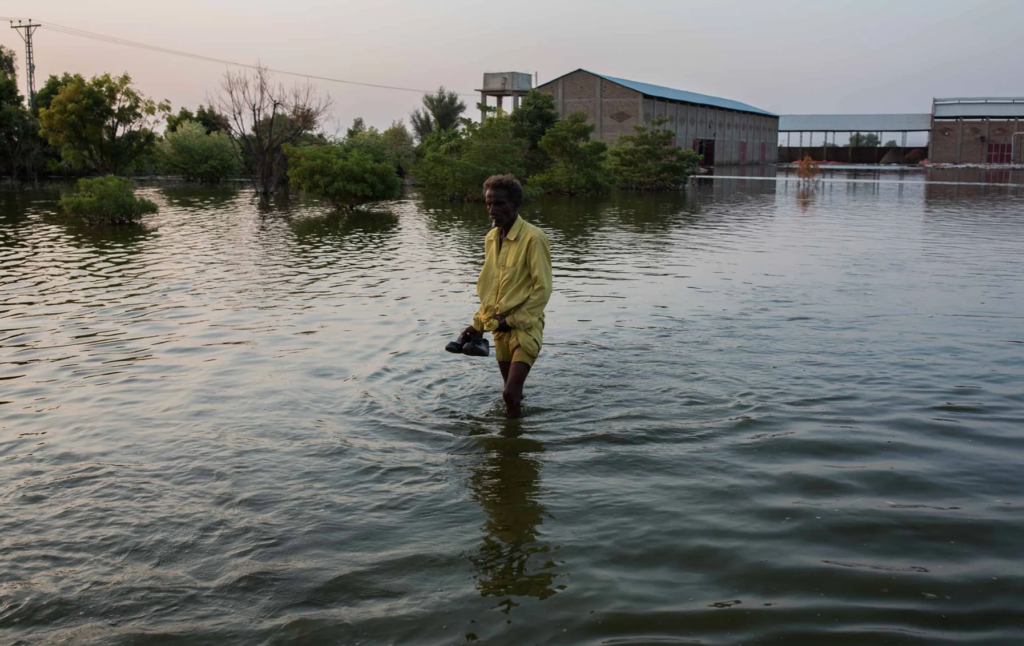We have tried, in various ways, to convey to the world the scale of destruction caused by recent floods in Pakistan, because, apparently, a third of the country underwater and thirty-three million lives upended doesn’t cut it. Pakistan’s climate minister has called it Biblical. We have shot and shared videos in which the landmark New Honeymoon Hotel crumbles in the duration of a TikTok. The U.N. Secretary-General, António Guterres, who is seventy-three and has called the climate crisis a “code red for humanity,” visited Pakistan and said that he hadn’t seen this scale of climate carnage in his life. Some of us have created maps showing that the areas underwater are larger than Britain. We have shown pictures of dead and starving cattle to appeal to animal-lovers. We have posted videos of puppies being heroically rescued from rushing waters.
Maybe when the world seems to be ending, it needs poets. A poet in Khairpur, in southern Pakistan, one of the worst-affected areas, was asked by a journalist if he had received a tent to shelter his family. He found the idea so improbable that he asked, “Why are you making fun of me? Why would anyone give me a tent?” Pakistanis are saying that charity tents and emergency supplies are welcome, but what we need and want is compensation for climate-related loss and damage. Although much of the world seems to agree in principle, there is a we-have-all-heard-this-before weariness in the air. Our innovative communications have little impact. The U.S. has offered fifty million dollars and “long-term” support, the U.N. has appealed for a hundred and sixty million, France has offered to hold a donors’ conference, Angelina Jolie has flown in and said that she’s never seen such devastation. President Biden casually mentioned at the U.N. General Assembly that Pakistan “needs help,” without any specifics. This all sounds like a lot until you remember that Pakistan’s losses are estimated to be around thirty billion dollars.
Experts have pointed out that this is not the kind of flood that causes weeks of havoc and then leaves behind fertile lands. Six months from now, flooded fields still may not be ready for cultivation. Most people affected by the floods live off the land, from crop to crop. Waterborne diseases and food shortages are already rampant. Climate scientists who have studied Pakistani floods have concluded that they can only predict more unpredictability.
Scientists are clear, however, that the catastrophe in Pakistan is linked to global warming. Pakistan generates less than one per cent of the world’s carbon emissions. We are quite good at blaming ourselves and our governments for our misfortunes, but global warming is overwhelmingly caused by rich folks living thousands of miles away, mostly in the West, by people who know that their air-conditioned homes and midsize cars and Caribbean holidays have snatched away the home and livelihood of someone in a village in Pakistan.
The West sees its culpability in this man-made disaster but prefers to blame the victim. I think of a fable that I grew up with, in which a lamb drinks from a river downstream until a lion accuses it of polluting the river upstream. In the version of the fable that I remember, the lion eats the lamb as punishment. Imagine this: the driver of an S.U.V. speeds into a country lane, hits a person on a bicycle, and then, instead of paying damages, asks the cyclist to drive an electric vehicle powered by renewable energy. The driver of the S.U.V. wonders why the cyclist wasn’t more resilient, and asks, “Why didn’t you plan for a future where my car might come and destroy your bicycle and break your leg? You could have prepared for a better future, for apocalyptic floods, but what did you do? You prepared a petition for reparations? And you don’t even have a practical plan for how these reparations would work?”
Those calling for climate reparations received an answer from America’s climate envoy, John Kerry, at the U.N. General Assembly last week. “You tell me the government in the world that has trillions of dollars, ’cause that’s what it costs,” he said, perhaps steeling himself for difficult questions at November’s global climate conference, cop27, in Egypt. Western governments do have trillions of dollars, and they have had more than a decade to think through how climate reparations should work. Kerry sounded like he was haggling over the price of life jackets with drowning people.
Read more of this article here The New Yorker
By Mohammed Hanif via The New Yorker
Photograph by Asim Hafeez / Getty
